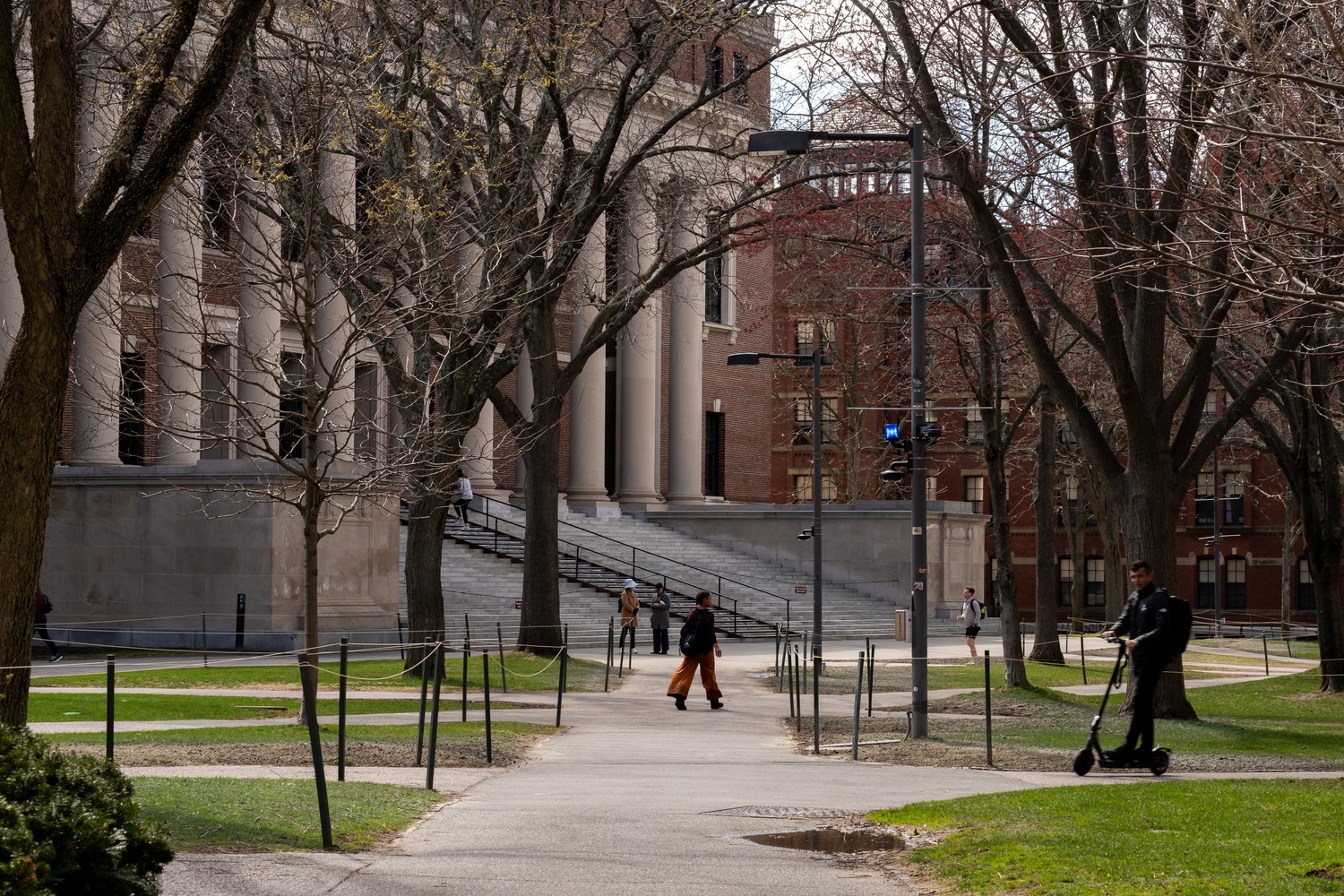
News
Summers Will Not Finish Semester of Teaching as Harvard Investigates Epstein Ties

News
Harvard College Students Report Favoring Divestment from Israel in HUA Survey

News
‘He Should Resign’: Harvard Undergrads Take Hard Line Against Summers Over Epstein Scandal

News
Harvard To Launch New Investigation Into Epstein’s Ties to Summers, Other University Affiliates

News
Harvard Students To Vote on Divestment From Israel in Inaugural HUA Election Survey
Scores of Researchers Receive Termination Notices After Federal Government Cuts Most Grants to Harvard

More than 100 Harvard researchers received termination notices for federally funded research projects on Thursday, as sweeping cuts to the majority of Harvard’s federal grants begin taking effect across the University’s labs.
The notices, delivered via email from Harvard’s Grants Management Application Suite, informed recipients that their projects had been terminated “per notice from the federal funding agency” and contained a list of terminated grants.
“You are receiving this e-mail because one (or more) of your projects have been terminated,” the emails read.
Harvard Assistant Vice President for Sponsored Programs Kelly Morrison and Chief Research Compliance Officer Ara Tahmassian had warned the researchers in a separate Wednesday email that the majority of Harvard’s awards from federal agencies were terminated.
“The University has received letters from most federal agencies indicating that the majority of our active, direct federal grants have been terminated,” they wrote to recipients.
Some of the terminated grants exceeded $1 million, funding entire research operations, including salaries for graduate students, postdoctoral fellows, and lab technicians.
“At this stage, I do not know what the terminations mean for my current group of 10 graduate students and postdocs, of which 8 relied 100 percent on those grants for salary support,” wrote Chemistry professor Eric N. Jacobsen.
Harvard President Alan M. Garber ’76 also announced on Wednesday that the University would allocate $250 million in funding over the next year to support research affected by federal actions.
Morrison and Tahmassian instructed principal investigators with affected awards to continue working on their projects and charging expenses to project funds.
Lab directors were also told to limit non-personnel spending to essential needs, pause capital equipment purchases and new contractual commitments where appropriate, evaluate whether outgoing subawards could be ended, and halt any new hiring or backfills tied to the affected grants.
The widespread terminations mark the biggest tangible blow yet in the federal funding crisis at Harvard, where researchers have been bracing for fallout from Harvard’s battle with the White House for weeks. Seven federal agencies formally notified the University last week that they would cancel existing grants, triggering Thursday’s termination wave.
The blanket terminations are the latest in a series of hits to Harvard’s research enterprise — a $2.2 billion slash in April, another $450 million cut weeks later, and a ban on future federal awards to Harvard. After the initial freeze in April, a few researchers received stop-work orders directly from federal agencies.
In response, schools across the University had already begun implementing emergency planning.
The Faculty of Arts and Sciences asked departments to prepare for budget cuts of up to 20 percent. The School of Public Health requested lab funding breakdowns to help allocate “scarce internal resources,” and it announced layoffs and program cuts alongside its neighbor Harvard Medical School shortly after the initial $2.2 billion cut.
Facing uncertainty, lab directors say their current priority is keeping their teams employed.
“In my own group, the terminations mean that I will be dipping into some of my emergency savings (industry gifts and other non-federal money that I was able to save up for emergencies),” Computer Science professor Krzysztof Z. Gajos wrote in an emailed statement. “My students have also already offered to do additional TF-ing to help stretch our funding.”
Several lab directors said they worry the funding crisis will hit students and early-career researchers hardest.
“The largest and most immediate concern is the financial security of the postdocs, graduate students, technicians, and others working in these labs who are incredibly committed to their work and are often in financially vulnerable situations,” Organismic and Evolutionary Biology professor Benton N. Taylor wrote. “For most PIs stewarding these grants, our current focus is on keeping these people secure.”
“The tragedy here is that we are going to sacrifice an entire generation of young scientists and engineers,” wrote William L. Wilson, executive director of the Center for Nanoscale Systems.
Students have already begun feeling the impacts of Thursday’s terminations. On Friday, undergraduates who applied to the School of Engineering and Applied Sciences’ Research Experience for Undergraduates — a program largely supported by the National Science Foundation — received early rejection notices.
“We regret to inform you that, due to significant reductions in federal funding, we have had to end our admissions process early and are unable to offer additional placements this year,” the email read. “We also welcome you to share your experience with your state representatives, as continued investment in research opportunities is critical for students like yourself.”
Many Harvard researchers took to social media to express their anger and disbelief, drawing attention to the abrupt nature of the cuts.
“My partner Serena’s mom is dying from ALS. The NIH grant supporting the scientists in my lab working hard on a cure was just terminated. No words,” HMS professor David A. Sinclair wrote in a post on X.
—Staff writer Saketh Sundar can be reached at saketh.sundar@thecrimson.com. Follow him on X @saketh_sundar.
Want to keep up with breaking news? Subscribe to our email newsletter.
